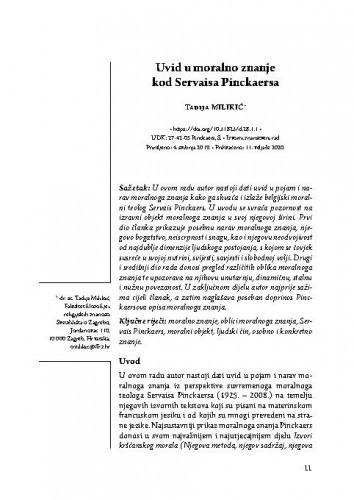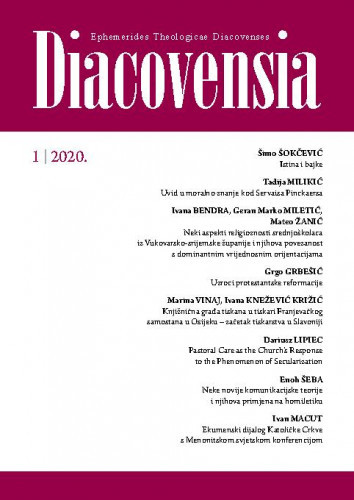U ovom radu autor nastoji dati uvid u pojam i narav moralnoga znanja kako ga shvaća i izlaže belgijski moralni teolog Servais Pinckaers. U uvodu se svraća pozornost na izravni objekt moralnoga znanja u svoj njegovoj širini. Prvi dio članka prikazuje posebnu narav moralnoga znanja, njegovo bogatstvo, neiscrpnost i snagu, kao i njegovu neodvojivost od najdublje dimenzije ljudskoga postojanja, s kojom se čovjek susreće u svojoj nutrini, svijesti, savjesti i slobodnoj volji. Drugi i središnji dio rada donosi pregled različitih oblika moralnoga znanja te upozorava na njihovu unutarnju, dinamičnu, stalnu i nužnu povezanost. U zaključnom dijelu autor najprije sažima cijeli članak, a zatim naglašava poseban doprinos Pinckaersova opisa moralnoga znanja.; In this paper the author focuses on the concept and nature of moral knowledge as understood and presented by Servais Pinckaers, one of the most renowned and acknowledged contemporary authority on the moral teachings of St. Thomas Aquinas who rightfully occupies a prominent place within the Christian moral-theological tradition. In the introduction our attention is drawn to the immediate object of moral knowledge in all its breadth: human activity which ensues from human free will. It should, in no regard, be narrowed down neither to those human acts falling under any form of legal obligation or imperative, nor limited to any human activity which can be subjected to observation and analysis by the positive sciences. The introductory exposition is followed by two more parts. The first part points out the special nature of moral knowledge, its richness, inexhaustibility and strength, as well as its inseparability from the deepest dimension of human existence which man encounters within his inner self, his consciousness, conscience, and free will. The second and central part of the paper brings an overview of various forms of moral knowledge and underlines their internal, dynamic, constant and necessary connectedness stemming from concrete personal moral experience wherein lies the source, purpose and sole approach to moral knowledge. The concluding part presents a summary of the entire paper and highlights the special contribution contained in Pinckaers’ description of moral knowledge. The Belgian theologian strongly emphasizes that moral knowledge emerges and is shaped, first and foremost, by human activity, that it is developed through moral reflection and is confirmed and fulfilled similarly by concrete human activity.
Sažetak

 Diacovensia : teološki prilozi : 28,1(2020) / glavni i odgovorni urednik, editor-in-chief Šimo Šokčević.
Diacovensia : teološki prilozi : 28,1(2020) / glavni i odgovorni urednik, editor-in-chief Šimo Šokčević.